- Home
- News And Events
- News
- The Brief #004 Using Ai To Connect Citizens And Parliaments
THE BRIEF #004 Using AI to Connect Citizens and Parliaments

IN BRIEF
In a context of democratic recession, AI tools offer the opportunity to facilitate the dialogue between parliaments and their constituencies: they can help citizens express their opinions and participate in law-making and translate complex legislative texts into plain language that is accessible to everyone.
THE GIST
Trust in democratic institutions is alarmingly low worldwide. According to a 2023 OECD survey, 44% of respondents reported no or low trust in their national governments. Furthermore, a majority of 53% expressed a sense of disenfranchisement, believing that their political systems do not allow them to have a meaningful say, which correlates strongly with the pervasive low trust levels in governmental institutions.
This threatens the stability of democratic societies.
While AI raises legitimate concerns about privacy, bias, and societal impact, it also offers potential to enhance democracy. AI tools can improve transparency, accountability, and citizen participation, helping to shift public perceptions and demonstrate their positive applications in democratic settings.
Additionally, AI can facilitate deeper democratic engagement by simplifying complex legislative texts and making the law-making process more accessible to citizens. AI can also enhance communication between citizens and their parliamentary representatives, ensuring that public feedback is effectively heard and integrated.
THE TAKEAWAY
Innovators are already using AI to improve how information is shared, discussions are held, and policies are made within the legislative process:
Application 1 - Simplifying the Language of Parliaments: The digital era has flooded us with information, yet legislative texts remain complex and daunting. AI tools can simplify these documents, making them more understandable to the public. This clarity promotes democratic engagement and empowers more informed civic discussions. An example of this application is the Panoramic initiative by Make.org, which aims to summarize parliamentary language and make it accessible to a wider audience. It could also be applied in the context of multi-lingual countries, where legislation might not be written in everyone’s native language.
Application 2 - Making It Easier to Speak Up: Public discourse can be intimidating, deterring many from participating. Digital platforms can create supportive spaces for political dialogue, thus encouraging more voices to be heard. For instance, the MAPLE initiative offers tools that help individuals articulate informed opinions to be submitted to the Massachusetts Legislature, thus improving the participatory political environment.
Application 3 - Guiding Fair Discussions: Deliberation introduces diverse viewpoints and seeks consensus. Traditional platforms can lead to polarized debates. However, AI-enhanced platforms, such as vTaiwan, promote constructive dialogue and trust, ensuring discussions are inclusive and productive, crucial for meaningful consensus.
Application 4 - Communicating Public Opinion to Leaders: It is hard to get your message through to busy policymakers. AI tools streamline this process, ensuring that the collective voice of the public is clearly and effectively communicated to decision-makers. Their adaptation to different deliberative scales ensures that policymakers can effectively translate public consensus into action. For example, MAPLE is also using AI to summarize and categorize public testimony, ensuring that decision-makers receive clear and organized insights into public opinion, tailored to the specific deliberative needs of various policymaking scales.
As AI tools expand, opportunities to enhance transparency, accountability, and citizen participation will grow. This is especially crucial at a time when greater trust in institutions is urgently needed.
DELVE DEEPER
Applications of AI to Enhance Legislative Engagement by Alicia Combaz, David Mas, Nathan Sanders and Matthee Victor. Make.org and MAPLE are pioneering AI platforms that enhance how citizens engage with legislative processes. These tools simplify policy details, help users express their opinions, and analyze public sentiments to pinpoint areas of consensus and debate. This approach aims to make policymaking more participatory and transparent, closing the gap between citizens and their governments.
Improving Political Representation through Data by Peter Loewen. Data-driven politics could dramatically improve how representatives understand and address constituent needs. Effective data use enhances political representation and policymaking, ensuring decisions reflect the public’s desires and promote informed governance.